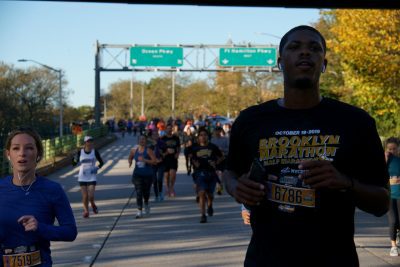Photo illustration by Johansen Peralta
Two wheels good: A new history of the not-so-humble bicycle
Journalist Jody Rosen joins 'Brooklyn Magazine: The Podcast' to discuss his new book, which takes a fresh look at 200 years of the bike
Like what you’re hearing? Subscribe to us at iTunes, check us out on Spotify and hear us on Google, Amazon, Stitcher and TuneIn. This is our RSS feed. Tell a friend!
Over the course of the past 200 years there has been no shortage of ink spilled over the bicycle. There’s been hagiography, romanticization, demonization; there have been fears and hopes and scorn and even porn heaped onto the bike’s sturdy frame.
- “Get a bicycle. You will not regret it. If you live,” Mark Twain wrote in “Taming the Bicycle,” a short piece published posthumously in 1917.
- South African anti-apartheid warrior Bishop Desmond Tutu is said to have quipped: “Give a man a fish and feed him for a day. Teach a man to fish and feed him for a lifetime. Teach a man to cycle and he will realize fishing is stupid and boring.”
- Susan B. Anthony was a fan. “Let me tell you what I think of bicycling,” she wrote in 1896. “I think it has done more to emancipate women than anything else in the world.”
- Then there’s Chilean politician José Antonio Viera-Gallo, who said: “Socialism can only arrive by bicycle.”
And this week a new book takes a fresh, patchwork look at the humble machine. “Two Wheels Good: The History and Mystery of the Bicycle” is meticulously researched and breezily written by New York Times Magazine contributing writer Jody Rosen.
“Something people may not realize these days is how hard the bicycle hit the nineteenth century,” says Rosen, who is this week’s guest on “Brooklyn Magazine: The Podcast.” “This is the period that gave us the steam locomotive, the daguerreotype, photography, the phonograph. The fact that the bicycle at that time was regarded as this hugely important and transformative invention is something people have lost sight of.”
Rosen himself is a Brooklynite, urban cyclist and journalist. “I love bikes, been fascinated by their history and wanted to write a different kind of book about bicycles,” he says on the podcast. His is a book that charts a series of rises and falls, booms and busts of the bike. “It’s always reemerging and speaking to its moment, so now in the digital age and this moment of pandemic and climate change and incipient fascism and global collapse, suddenly the bicycle again is a tool that is really in lots of ways both useful and seen by many as a solution to many problems especially in cities.”
Many of those cities are in the global south, where Rosen takes us. He rides through Dhaka, the capital and largest city of Bangladesh, where the bicycle is integral to daily life and survival. He takes us to the High Himalayas of Bhutan and its monstrous hills.
“Asia is the bicycle heartland,” he says. “The conversation about the bicycle here, we think about the bicycle as a lifestyle choice, an accessory, an accoutrement of a yuppie lifestyle in the way it’s framed in the press.” For millions, though, the bicycle is an essential tool.
In a wide-ranging conversation, we explore how this simple machine, which has remained largely unchanged for two centuries, “arrived in the world in a way that made no sense,” has served as a tool of both freedom and oppression, women’s liberation, quite literally ushered in the space age, and more recently played a role in Black Lives Matter demonstrations—by both demonstrators and the police that tried to stop them.
Let’s ride.
Check out this episode of “Brooklyn Magazine: The Podcast” for more. Subscribe and listen wherever you get your podcasts.
You might also like 


























